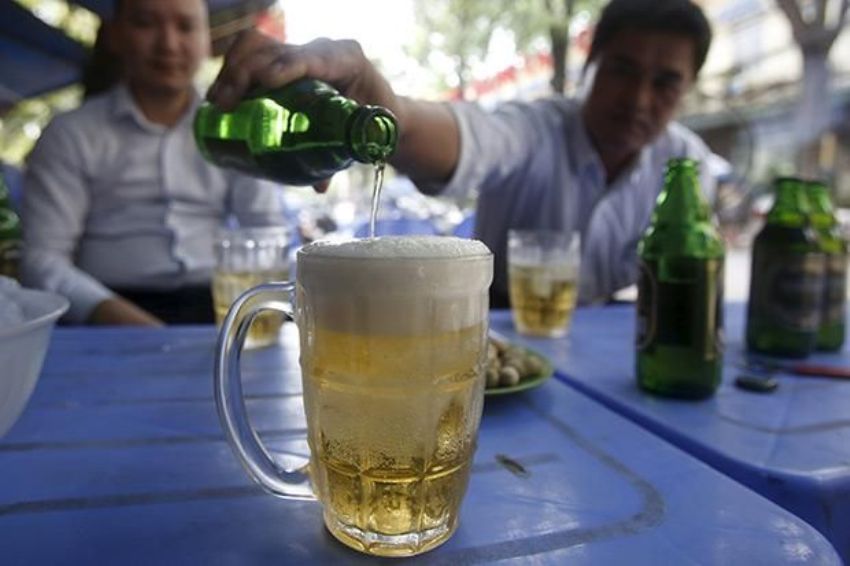Health
Top 10 Foods to Avoid if You Have Enlarged Prostate

Enlarged prostate, also known as prostatomegaly, is a common condition that affects many men as they age. While there are various factors that can contribute to the development of an enlarged prostate, diet plays a crucial role in managing the symptoms associated with this condition.
In this article, we will explore 10 foods to avoid if you have an enlarged prostate, shedding light on dietary choices that can positively impact your prostate health. Additionally, we’ll touch upon the significance of understanding prostatomegaly grades to manage the condition effectively.

-
Red Meat
High consumption of red meat, especially processed meats like sausages and hot dogs, has been linked to an increased risk of prostate issues. These meats often contain saturated fats that can contribute to inflammation and negatively impact prostate health. Opting for leaner protein sources such as fish, chicken, or plant-based proteins can be a healthier choice for individuals with an enlarged prostate.
- Dairy Products
Certain dairy products, particularly those high in fat, may worsen symptoms associated with an enlarged prostate. Full-fat dairy items like whole milk and cheese can contribute to inflammation. Choosing low-fat or non-dairy alternatives like almond or soy milk can help manage symptoms while still ensuring adequate calcium intake.
- Caffeine and Spicy Foods
Caffeine and spicy foods are known to irritate the bladder, potentially exacerbating urinary symptoms in individuals with an enlarged prostate. Coffee, tea, and spicy dishes can contribute to increased frequency of urination and discomfort. Opting for decaffeinated beverages and reducing the intake of spicy foods can provide relief.

- Sugary Foods and Beverages
High sugar intake has been associated with inflammation and may contribute to worsening symptoms of prostatomegaly. Processed foods, sugary snacks, and sweetened beverages should be limited in the diet. Choosing whole, unprocessed foods and opting for natural sweeteners can be a healthier alternative.

- Alcohol
Excessive alcohol consumption can negatively impact prostate health. Alcohol can irritate the bladder and lead to increased urinary frequency. It’s advisable for individuals with an enlarged prostate to limit alcohol intake and stay hydrated with water instead.
- Fried and Processed Foods
Fried and processed foods often contain trans fats, which can contribute to inflammation and negatively affect overall health, including prostate health. Choosing foods that are baked, grilled, or steamed can be a healthier option for individuals managing an enlarged prostate.

- Salt
High sodium intake can lead to fluid retention and may worsen urinary symptoms in individuals with an enlarged prostate. Processed foods, canned soups, and salty snacks should be limited. Opting for fresh fruits and vegetables and using herbs and spices for flavoring can help reduce sodium intake.
- Artificial Sweeteners
Certain artificial sweeteners, such as aspartame, commonly found in diet sodas and sugar-free products, may irritate the bladder and worsen urinary symptoms. Opting for natural sweeteners or limiting sweetener intake altogether can be beneficial.

- High Oxalate Foods
Foods high in oxalates, such as chocolate, nuts, and certain vegetables, can contribute to the formation of kidney stones. While kidney stones are not directly related to an enlarged prostate, they can lead to additional complications. Moderation in the consumption of high oxalate foods is recommended.
- Tomato-Based Products
While tomatoes themselves are rich in antioxidants, tomato-based products like sauces and ketchup can be problematic for individuals with an enlarged prostate. These products may contain high levels of acid, which can irritate the bladder. Moderation in consumption is advised.
Must Read: Foods to Avoid with Enlarged Prostate

Understanding Prostatomegaly Grades
Prostatomegaly grades are a classification system used by medical professionals to assess the severity of an enlarged prostate. The grades range from I to IV, with each grade indicating an increasing level of severity.
Monitoring prostatomegaly grades is crucial for developing an appropriate treatment plan and managing the condition effectively. Regular check-ups with a healthcare provider can help individuals with an enlarged prostate stay informed about their condition and make necessary adjustments to their lifestyle, including dietary choices.

Conclusion on an Enlarged prostate
In conclusion, making informed dietary choices is essential for managing the symptoms of an enlarged prostate. By avoiding certain foods and embracing a prostate-friendly diet, individuals can positively impact their overall prostate health.
Additionally, understanding prostatomegaly grades and maintaining regular medical check-ups are crucial steps in effectively managing this common condition. Remember, it’s always advisable to consult with a healthcare professional for personalized advice tailored to individual health needs.
Keywords: treatment for an enlarged prostate gland, natural remedies for enlarged prostate, can an enlarged prostate be cured

Health
Report Causes Pfizer Stock to Climb Approximately $1 Billion Acquired by Starboard

(VOR News) – According to a rumor that activist investor Pfizer Starboard Value has taken a holding in the struggling pharmaceutical business that is expected to be worth around one billion dollars, the stock of Pfizer (PFE) is on the increase in premarket trading on Monday.
This comes after the report was made public. The report was made available to the general public following this. Starboard Value was successful in moving forward with the acquisition of the position.
Starboard is said to have approached Ian Read, a former chief executive officer of Pfizer, and Frank D’Amelio, a former chief financial officer, in order to seek assistance with its goals of boosting the performance of the company, according to the Wall Street Journal. Read and D’Amelio are both former Pfizer executives.
The purpose of this is to facilitate the accomplishment of its objectives, which include enhancing the overall performance of the firm.
In their previous jobs, D’Amelio and Read were chief financial officers.
It is stated in the report that the hedge fund is of the opinion that Pfizer, which is currently being managed by Albert Bourla, who succeeded Read as Chief Executive Officer (CEO) in 2019, does not demonstrate the same level of mergers and acquisitions (M&A) discipline that Read did. Bourla took over for Read in 2019. Read was succeeded by Bourla in the year 2019.
Pfizer, a multinational pharmaceutical conglomerate, has made substantial investments in the acquisition of more companies that are involved in the research and development of cancer medicines.
These businesses have been acquired for billions of dollars. The biotechnology company Seagen, which was acquired by Pfizer in the previous year for a price of $43 billion, is included in this category. One of the businesses that can be classified as belonging to this category is Seagen.
In spite of the fact that the S&P 500 Index experienced a 21% increase in 2024.
No major trading occurred in Pfizer stock that year.
Due to the fact that the demand for Pfizer’s COVID-19 vaccines fell after the firm reached its pandemic peak in 2021, the share price of the corporation has decreased by over fifty percent since that time.
This drop has occurred ever since the company’s shares reached their maximum peak, which was during the time that this decline occurred. Not only have they not changed at all, but they have also remained essentially stable. This is in contrast to the S&P 500, which has gained 21% since the beginning of this year.
Recently, the corporation was forced to take a hit when it decided to recall all of the sickle cell illness medications that it had distributed all over the world.
Fears that the prescription could lead patients to experience severe agony and possibly even death were the impetus for the decision to recall the product. In spite of the fact that Pfizer’s stock is increasing by almost three percent as a result of the news that followed the company’s decision, this is the circumstance that has come about.
SOURCE: IPN
SEE ALSO:
New Study Reveals Drinking Soda Pop Increases the Risk of Stroke
The Mpox Vaccine’s Protection Decreases Within a Year; Booster Requirements
Health
New Study Reveals Drinking Soda Pop Increases the Risk of Stroke

A recent report from global research indicates that excessive consumption of coffee or soda pop is associated with an increased risk of stroke, although the intake of black and green tea is correlated with a reduced risk. Excessive consumption of soda pop or coffee warrants caution!
Recent research indicates that it may substantially elevate the risk of stroke.
Consuming four cups of coffee daily elevates the risk of stroke, according to studies, although ingesting 3-4 cups of black or green tea daily typically offers protection against stroke. Additionally, consume more coffee; it may reduce your risk of mortality.
Recent findings from global research studies co-led by the University of Galway and McMaster University, alongside an international consortium of stroke researchers, indicate that soda, encompassing both sugar-sweetened and artificially sweetened variants such as diet or zero sugar, is associated with a 22 percent heightened risk of stroke. The risk escalated significantly with the consumption of two or more of these beverages daily.
Stroke Risk Fizzy Drinks and Soda Pop
The correlation between fizzy drinks consumption and stroke risk was most pronounced in Europe, the Middle East, Africa, and South America. Women exhibit the most elevated risk of stroke from bleeding (intracranial hemorrhage) associated with fruit juice beverages. Consuming over 7 cups of water daily diminishes the likelihood of stroke due to a clot.
Researchers observed that numerous items advertised as fruit juice are derived from concentrates and have added sugars and preservatives, potentially negating the advantages often associated with fresh fruit and instead elevating stroke risk.
Fruit juice beverages were associated with a 37 percent heightened risk of stroke resulting from bleeding (intracranial hemorrhage). Consuming two of these beverages daily increases the risk thrice.
Consuming over four cups of coffee daily elevates the risk of stroke by 37 percent, although lower consumption levels do not correlate with stroke risk. Conversely, tea consumption was associated with an 18-20 percent reduction in stroke risk. Additionally, consuming 3-4 cups daily of black tea, such as Breakfast and Earl Grey varieties, excluding green and herbal teas, was associated with a 29 percent reduced risk of stroke.
Consuming 3-4 cups of green tea daily was associated with a 27 percent reduction in stroke risk. Notably, the addition of milk may diminish or inhibit the advantageous effects of antioxidants present in tea. The lower risk of stroke associated with tea consumption was negated for individuals who added milk.
Disclaimer: This article is intended solely for informational reasons and should not be considered a replacement for professional medical counsel. Consistently consult your physician regarding any inquiries pertaining to a medical problem.
Related News:
Starbucks Faces Sales Decline Amid Price Fatigue and Rising Competition
Starbucks Faces Sales Decline Amid Price Fatigue and Rising Competition
Health
Following a Diagnosis of Breast Cancer, What Else Should You Know?

(VOR News) – Even though breast cancer affects one in eight American women, receiving a diagnosis can make a woman feel isolated.
Experts in breast cancer from the American College of Physicians (ACS) advise patients on how to manage their disease so that they may better cope with this awful information.
First, the kind and stage of breast cancer dictates the course of your care.
In addition to immunotherapy and chemotherapy, there are various surgical options available for the treatment of breast cancer.
Women of African descent are disproportionately affected by triple-negative breast cancer, an extremely aggressive form of the disease that has never proven easy to treat.
According to the American Cancer Society, pembrolizumab (Keytruda), an immunotherapy, has been shown to be helpful when combined with chemotherapy and is currently the recommended course of treatment for certain combinations of triple-negative breast cancer.
In her presentation, Dr. Katharine Yao said, “It’s really important that the patient and physician discuss the patient’s preferences and values when deciding what type of treatment to pursue and that they have an honest, individualized discussion with their care team.”
She is currently responsible for developing breast cancer treatment recommendations for more than 575 hospitals and institutions nationwide in her role as chair of the American College of Surgeons’ National Accreditation Program for Breast Institutions (NAPBC).
Yao, vice chair of research at Endeavor Health NorthShore Hospitals in New York, pointed out that each decision made about a patient’s treatment plan should take her preferences and diagnosis into consideration.
She ought to think about whether she would prefer a mastectomy—a surgical procedure that involves removing the entire breast with or without reconstruction—or a lumpectomy, which involves a surgical procedure that spares part of the breast tissue.
She stated that “the breast cancer you have may be very different from the breast cancer you hear about in your neighbor, colleague, or friend” in a press release issued by the American Cancer Society (ACS).
“Consider that while discussing breast cancer with others.”
Throughout your journey, it is critical that you look after your emotional health because having breast cancer may have a detrimental impact on your mental health.
“Getting a cancer diagnosis does not mean that everything in your life stops to be normal.” Director of the Fellowship in the Diseases of the Breast program at the Winthrop P. Rockefeller Cancer Institute at the University of Arkansas and state head of the American Cancer Society Commission on Cancer for Arkansas, Dr. Daniela Ochoa She thinks adding the burden of a cancer diagnosis and treatment to all the other pressures in life may be taxing.
“Managing stress and emotional health is vital component of a treatment plan.”
Ochoa recommends clinically trained psychologists and social workers who have assisted people in coping with cancer to anyone receiving treatment. Learning coping techniques might also be facilitated by joining cancer support groups or cancer wellness initiatives.
Breast cancer specialists say your care team is crucial.
The American Cancer Society (ACS) defines comprehensive care as having support at every stage of the procedure from surgeons, oncologists, patient navigators, nurses, social workers, psychologists, and other specialists.
After receiving a breast cancer diagnosis, women should see a surgeon or medical oncologist to explore their options; nevertheless, treatment shouldn’t be discontinued after just one appointment or after surgery is over.
Additionally, you can ask trustworthy friends or family members to accompany you to appointments and aid you with research or notes. They could serve as a network of support for you.
Yao stated in his talk that “one of the most important things is that patients should search out a team they have confidence in, that they trust will have their back when they need it, and a team they feel they can get access to and that will help them when they are in need.”
SOURCE: MP
SEE ALSO:
The Mpox Vaccine’s Protection Decreases Within a Year; Booster Requirements
COVID was a Paradigm Shift in Health Policymaking, Says Commissioner Stella Kyriakides.
Rwanda Reports 8 Deaths Linked To Ebola-Like Marburg Virus Days After It Declared An Outbreak
-

 News3 years ago
News3 years agoLet’s Know About Ultra High Net Worth Individual
-
Entertainment2 years ago
Mabelle Prior: The Voice of Hope, Resilience, and Diversity Inspiring Generations
-

 Health4 years ago
Health4 years agoHow Much Ivermectin Should You Take?
-

 Tech2 years ago
Tech2 years agoTop Forex Brokers of 2023: Reviews and Analysis for Successful Trading
-

 Lifestyles3 years ago
Lifestyles3 years agoAries Soulmate Signs
-

 Movies2 years ago
Movies2 years agoWhat Should I Do If Disney Plus Keeps Logging Me Out of TV?
-

 Health3 years ago
Health3 years agoCan I Buy Ivermectin Without A Prescription in the USA?
-

 Learning3 years ago
Learning3 years agoVirtual Numbers: What Are They For?